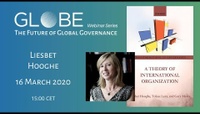GLOBE Webinar | A Theory of International Organization
Liesbet Hooghe (European University Institute)
Webinar available in video:
Liesbet Hooghe joins the GLOBE Webinar Series to discuss her new book "A Theory of International Organization" (2019, Oxford University Press).
The GLOBE Webinar Series – The Future of Global Governance – presents the latest and most cutting-edge research in global governance and gives audience members the opportunity to directly engage with leading scholars in the field. Each webinar focuses on a significant new book that has potential to shape future thought on global governance, featuring a presentation by the author, an intervention from an expert discussant, and a Q&A session with the audience.
Participation is free and webinars can be joined from anywhere in the world. Access the GLOBE Webinar Channel
About the book: Why do international organizations (IOs) look so different, yet so similar? The possibilities are diverse. Some international organizations have just a few member states, while others span the globe. Some are targeted at a specific problem, while others have policy portfolios as broad as national states. Some are run almost entirely by their member states, while others have independent courts, secretariats, and parliaments. Variation among international organizations appears as wide as that among states. This book explains the design and development of international organization in the postwar period. It theorizes that the basic set up of an IO responds to two forces: the functional impetus to tackle problems that spill beyond national borders and a desire for self-rule that can dampen cooperation where transnational community is thin. The book reveals both the causal power of functionalist pressures and the extent to which nationalism constrains the willingness of member states to engage in incomplete contracting. The implications of postfunctionalist theory for an IO's membership, policy portfolio, contractual specificity, and authoritative competences are tested using annual data for 76 IOs for 1950-2010.
About the author: Liesbet Hooghe is the W.R. Kenan Distinguished Professor of Political Science at UNC-Chapel Hill and Robert Schuman Fellow at the European University Institute, Florence. In 2017 she received the Daniel Elazar Distinguished Federalism Scholar Award of the APSA. Her chief focus is multilevel governance, European integration, political behavior, and international organization.
Discussant: Charles Roger (Institut Barcelona d’Estudis Internacionals)
Moderator: Kari Otteburn (Leuven Centre for Global Governance Studies)

